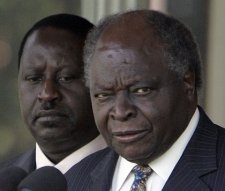By David Heller (Posted: January 16, 2009)
The Kenyan government’s power to undermine the press’ essential role in providing and interpreting access to information has been reaffirmed and strengthened by President Mwai Kibaki, who rang in the New Year by codifying a series of amendments to the controversial 1998 Communications Bill.
“While Press Freedom is a cardinal pillar of democracy,” the President explained, “this is a right that carries with it special duties and responsibilities. Press freedom must therefore be counterbalanced with other freedoms and must at all times take into account the overriding interest and the safety of Kenyans.”
The original Communications Bill liberalized and regulated the fledgling Kenyan communications sector. An early balancing act, it also reflected an unwillingness to fully cede control over the media’s content to private entities.
Section 88, the target of much disdain, empowers the Minister responsible for Internal Security “to take temporary possession of any telecommunication apparatus or any radio communication station or apparatus within Kenya,” upon “the declaration of any public emergency or in the interest of public safety and tranquility.”
This section also grants Kenya’s government the power to intercept, detain, and dispose; any telephone call, email, or letter, being transmitted at such a time.
Since being passed, the government has not been hesitant to exercise this power and wrest control of credible media outlets.
As The Standard reported,
At the height of the chaotic 2007 general election, the government deployed paramilitary personnel at [a] KICC media centre who flushed out journalists, sealed off the facility then switched off live transmission feeds. The government also banned live coverage of violent chaos across the country immediately [after] President Kibaki was sworn in late in the evening.
The new amendments do little to prevent such events from recurring. While their stated purpose is to euphemistically “help streamline and introduce regulatory provisions in electronic transactions and broadcasting,” they utterly fail to address Section 88 and in fact erect additional barriers to the free flow of information. Now, the government can control the press’ output without requiring the pretense of emergency.
As International Freedom of Expression eXchange reported,
The amendments… grant the Information Minister sweeping powers to control what can be broadcast, when and in what form. The Minister will also appoint the government-dominated Communication Commission, which is charged with licensing broadcasters and ensuring the broadcasts are of “good taste.” Among other provisions, penalties for press offences – fines and jail time – have also increased.
President Kibaki justified codifying these restrictive measures by referring to the amendments’ goal of initiating economic growth.
“The enactment of the new law,” he says, “would enhance investor confidence and lead to more jobs and economic benefits especially for our youth.”
He also took some parting shots at the Kenyan media – who’ve recently been very critical of Members of Parliaments’ inflated salaries – saying that the press must “recognize that freedom must go hand in hand with responsibility.”
Despite his ostensible commitment to democratic principles, President Kibaki misunderstands the relationship between freedom and responsibility. It is the responsibility of the press is to report the truth. Kenya has stacked the deck against its media so much so that it has undermined the ability of the press to uphold this responsibility and report even innocuous truth. What good is the press’ freedom then when their ability to fulfill this purpose is being co-opted?
Furthermore, Kibaki underestimates the supreme value of truth for democracies. Citizens’ knowledge of their governments’ true actions – made possible through their access to information – is an ideal of fundamental importance. It ought to always trump a state’s fleeting and capricious desires for prosperity, happiness, and even security or so-called interests.
Implicit in the President’s remarks is his desire for a balance between the ideals of a secure state and his peoples’ right to a free press. While the oft legitimate tension between societal safety and freedom of information is at the heart of many struggles over media censorship, he would do well to take a step back and see just how unbalanced his new laws have made these competing goals become. As they say, the truth hurts. Let’s hope there are enough courageous journalists left in Kenya to make him feel its sting.

Comments are closed.